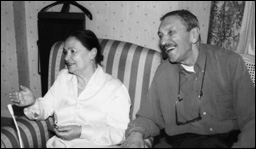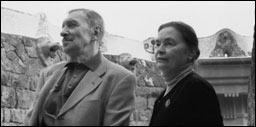
Gonzalo BlascoAn Interview with Marina Tarkovskaia and Alexander GordonThe following brief interview with Marina Tarkovskaia and Alexander Gordon was conducted on the evening of November 10, 2003 in Zaragoza, Spain, by Gonzalo Blasco. The interview is © www.andreitarkovski.org, and is reproduced here in English translation with their kind permission. The questions had been selected and agreed upon ahead of time by Gonzalo Blasco of andreitarkovski.org and Trond Trondsen of nostalghia.com. This interview was translated into English by Trond Trondsen based on the original Spanish transcript, which is located here. All photos on this page are © Gonzalo Blasco. Further photos and articles from Marina and Alexandr's visit to Spain may be found here (scroll down). 
Marina Tarkovskaia: Yes, that is correct. Feiginova was a woman who was very dedicated in her work, and she admired Andrei very much. After the first screening of Andrei Rublov, which was seen only by a few privileged people, they were ordered to trim the film, and so she did. The film was reduced from the 205 original minutes down to three hours. She decided on her own to take care of the original print, and it didn't see the light of day until 1988, when the film was finally screened again. Did she expose herself to danger by keeping that material.... in the Soviet era? MT: No, it did not pose any danger, because nobody knew about it. [***To anybody it concerned that too much to him.***] Feiginova was a very professional and interesting person. While working on the films of Tarkovski she would often suggest significant changes during the editing of the film. For example, in Mirror, Feiginova was the one who proposed that the scene with the stutterer open the film. [***That scene was one of the memories of Andrei in the house of its mother, of whom vió by television, and its predicted place era in half of the film.***] Feiginova proposed that this should be the optning shot og Mirror, and Andrei agreed. Another scene which Feignova rearranged was that of the monologue of Stalker's wife. This scene takes place in the bar, [*** and was predicted that the one happened just after char that had the three protagonists before starting off for the Zone.***] Feiginova suggested that it would be more interesting if the scene appeared at the very end, after the return of Stalker. To Andrei this did not seem appropriate at first, since the scene had been shot in the bar, whith interiors different from those in Stalker's house. Feiginova responded: "Nobody will notice that it was shot elsewhere, because they will all be intently concentrating on the actress," and it ws true: nobody notices this little detail unless it is pointed out to them, as [Alissa Freindlikh's] performance is so totally captivating. There is great interest out there in the script called KonsentratExtract — or Concentrate, about whether or not it was actually shot during the VGIK years. Was it just a script, an nothing more? How did it come into being? Were any parts of the script ever shot? MT: It was not exactly a script, t was more like a short story. It is an essay Andrei wrote during the VGIK entrance examination. It was written in a single sitting, and consists of six hand-written pages. For this work, Andrei was awarded the highest grade, a "5". The story is based on his experiences during his trip to Siberia in the summer of 1953. Andrei worked as an assistant in a scientific expedition that was sent to Siberia by the Gold Institute of Moscow. Although the official intention of the expedition was not to search for gold, but rather to search for diamonds... natural diamonds for industrial use, as these were in high demand by the USSR. The story was called Konsentrat, because in the process of analyzing rocks, a procedure had to be followed in which the rock "concentrated" four times so as to analyze its content. The expedition was surrounded by great mystery, it was considered a state secret. But the story was never shot — it was never produced for the screen. Many years later, I and Alexander wrote a script [**** for the study of Moscow (Sverdlovsk, now Yekaterinburg) for the accomplishment of a documentary one, in that guíón for the documentary one ***] yes, we included some fragments, some sequences taken from Andrei's Konsentrat. I and Alexander worked much and presented/displayed an extensive [*** bastente] script, but the producers of the film used a [**** reduced material enough,***] and they did not show to us the work prior to its opening. At that point we decided that we did not want our name in the title cards or end credits ofthe documentary. The film was a documentary, and it contained much material, incuding some extracts basd on Andrei's story Konsentrat. What was the documentary called, and in what year was it made? MT: the Summer in the Taiga de Andrei Tarkovskí, and is of 95 or perhaps 93. He is a documentary one in film, in video... I do not create. Who has the right of the script of Konsentrat, to that would have to request permission to publish it? MT: To the heir of Andrei, that is its son Andrei Andreievich, and to the VGIK. It was truth that was a fire in the VGIK that destroyed material rolled by Andrei, as the short ' Today is no salidá? Alexander Gordon: No, that must be false. Never there was no fire in the VGIK, that I know... But I can explain as they arose that type from rumors. The central television, as it were called in that one then, once in a while cleaned its archives. Possibly in the Seventies or before, it was even considered that ' Today there will be no salidá was little important a didactic work and was decided to eliminate it other films along with. Soon, when the name of Tarkovski was recognized, they regreted enormously it to have done. But, although it seems a miracle, the original negative was conserved. It does about five or seven years (1995-1997), in the museum of cinema of Moscow, a retrospective one with the works of Andrei of the VGIK was celebrated. The director of the museum of cinema of Moscow Naum Kliman, made a great work of investigation and found the negative. They found a negative of good quality, and indeed made a new copy for that retrospective one. And step the same with ' asesinos'? AG: No, of The Killers a copy in the VGIK, but single is conserved a version of the positivada and mounted film, not the original material... MT: ... the original negative was destroyed, although during years pirate copies of the film they circulated abroad in videocassete, perhaps by France. Although it is not known very well where they left. Exists material survivor of the first version of Stalker? MT: No, it does not exist. Feiginova, that was dedicated to the assembly, could perhaps conserve some material that soon it transmitted to Gosfilmofond, but I do not know it with exactitude; perhaps some fragments have been conserved. In any case, the second version was better. Until point was influence in Tarkovski of the classic Japanese directors, like Mizoguchi? AG: Tarkovski, from the beginning, in the cinema academy, showed much interest by everything what it was exhibited in the cinemas of Moscow, and gave the chance of which at that moment Japanese films were going in Moscow very interesting, of directors like Mizoguchi, Kurosawa and others not so known. These directors seemed to him very original to Andréi, as far as the form. For example, in some film scenes in negative were used, thing that Tarkovski repeated soon in the childhood of Iván. It is not a mere imitation, if not a very alive interest by everything what outside new. We formábamo a group very interested in the Italian cinema, in the films of Giussepe de Santis, Vittorio de Sica... and everything what constituted the Italian neorealism. Since There Will be no leave Today were a film very different from the others, he would want to know as he took that running, with so many actors. AG: This history is important.... Perhaps in my memories it occupies 15 or 20 pages, although I can give a brief review. With respect to the contributions done by both directors (I and Andrei), I believe that there was more contribution on the part of Andrei. We wrote together the script in the beginning, and was also a scriptwriter who quickly was replaced by another group of scriptwriters. The relations were very good during the first stage. During one second stage, Andrei completed the script with the scenes of the Hospital and the history of the volunteer who operates the pump, these ideas were of Andrei. The work was very friendly, and discutiamos the scenes in the eve. The main thing was created in the beginning in the script, and soon great changes were not made. It was a very easy work. Although difficulties arose, like, for example, when we had to obtain the light tank of the soldiers, or troops to cerrrar the place of the running, etc... The students of the VGIK participated, although the main paper interpreted a very famous actor, Oleg Burisov. In what city was There Will be no Leave Tpday shot? AG: He was rolled in Koursk. The actors were province people, who worked enchanted without receiving, to only leave in the film. The running lasted three months and other three months the assembly lasted; we received much collaboration on the part of the army, that helped us at any moment. There Will be no Leave Today is a film with a great budget, exist scenes with dozens of extras, many actors, taken care of clothes, etc... As it can be that a work of school, with students, had average tantísimos? AG: La film was a coproduction between the VGIK and the state television: the VGIK put the equipment and a small budget, but the TV put much money for the production. All those means were transformed into which we see in the screen. This film was a propagandistic film merely, destined to put in the television the day of the victory, of World War II, on the Germans. In that day the single TV relayed films and propagandistic épico material, on the greatnesses of the USSR. This film was emitted at least by TV during 3 years followed, although this did not turn it famous, since in that day the TV relays all the day films of the same type. As he took to Andrei the one of the election of a so conventional music, if in the rest of his films he put a great interest in the sound track? AG: they En that time, it was very common that music for the film was made specifically, and a composer contracted itself. We knew that he was not original, but much importance did not occur him. Andrei continued contracting composers who did original pieces to him in their films, until Solaris, where he began to use music of the great classic composers. How lived Andrei the accomplishment on a so conventional film? It was forced to accept the script?
AG: No, the script was made by us. VGIK proposed that we make a practice-film intended for TV
audiences, a propaganda piece on the victory of
the USSR over the Germans, and so on... We chose a easy, uncomplicated script.
We did not set out to do a masterpiece, but a film that was easy
to make and easy for the people to watch. Andrei was happy with this. He
had no problems with this approach.
|


